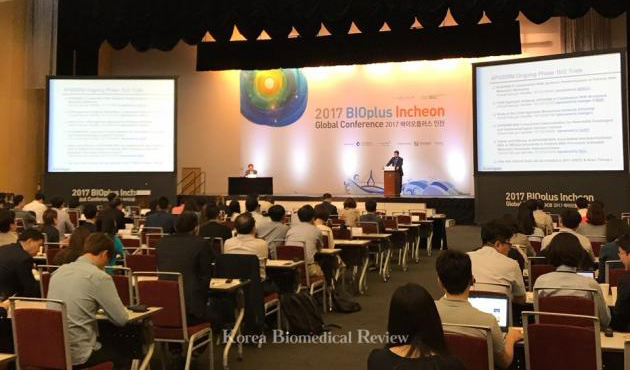BIOplus Incheon 2017 successfully finished their second annual global conference themed on biomedical product development on Wednesday.
The conference aimed at sharing knowledge for successfully developing biomedicine among participants, who talked about eight subjects ranging from the launch of biomedical development to the final documentation.
The first session led by Xiaodong Yang, CEO of Apexigen, dealt with the company's drug discovery know-how. Yang introduced the finding and research of autoimmunity and acquired immunity substances. The session went into detail regarding Apexigen’s new anti-cancer treatment candidate APX005M.

APX005M activates CD40, a key immune co-stimulatory receptor, which is essential in regulating the activation of both innate and adaptive immune responses against cancer. The drug is currently in phase 1b/2 clinical trial as a combination treatment with Opdivo (Ingredient: Nivolumab) in advanced solid tumors.
Marcella Goodnight, director of global technical operations of AstraZeneca, led a session regarding drug substance production. The session went into detail in high-temperature short time method (HTST] skid, which is a method of disinfecting a microorganism as a target object by minimizing the decomposition rate of a substance by treating microorganism at high temperatures for a short time. The process allows the complete inactivation of microorganisms contained within the solution.
The process has several advantages concerning the pasteurization sequence in that it has low utility costs and higher continuous output.
The subsequent session led by Stefan Heindl, business developer of Coriolis Pharma, talked about formulation in detail. It introduced innovative technologies and concepts for successful biopharmaceutical production and development, as well as explained the contents and issues about global strategies for raw material development.
Heindl delved into rapid and high-throughput tools for detection, characterization, and prediction of sub visible particles and other aggregates.
He concluded that through the high-throughput tool an early detection of aggregate particles is possible and the control strategy is an important part of the drug product development.
In the drug product production session, Karis Findlan, the director of supply chain and project management at Vetter, talked about experience and know-how on strategies in early requirements and clinical and global market development strategy for successful production.
Findlan stated that drug manufacturing is becoming more challenging for reasons such as regulatory requirements continuing to increase and more complex substances are entering development.
“Knowing your product and process, identifying risks early on and building quality by design has never been so important than before,” she added.
Later in the day, in the medical device session, Tobias Nemeth, director of business development delivery systems at Ypsomed Group, presented a development strategy of a self-injecting biosimilar as a new therapeutic agent, based on the company’s own accumulated experience.
In the clinical trial session, Gary Wang, portfolio director of Parexel International, made a presentation themed on the clinical development of biopharmaceuticals and shared the company’s know-how on clinical trial development strategies of current and future biopharmaceuticals.
In the final part of the session, speakers talked about the registering process and know-hows for the European Medicines Agency (EMA) and the documentation Biologics License Application for the FDA.
Seo Jeong-sun서정선, president of Korea biotechnology industry organization, expressed the organization's goal. “The most active field of bio-fusion, which is the core of the Fourth Industrial Revolution, is in the biopharmaceutical field,” Jeong said. “The Bioplus Incheon 2017 conference is a step toward developing Incheon into the bio-drug development capital of the world.”

